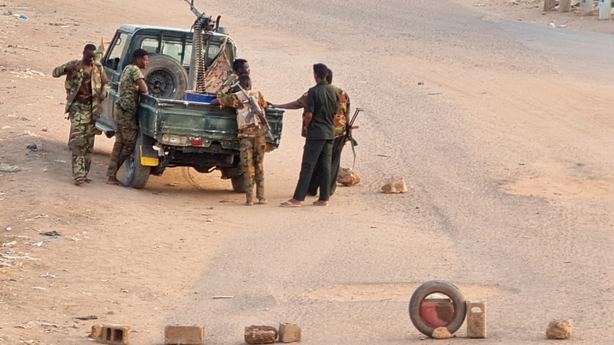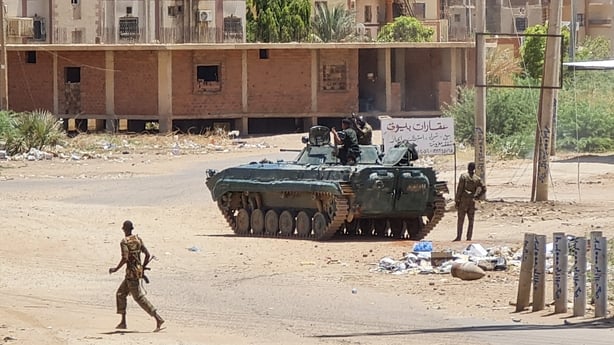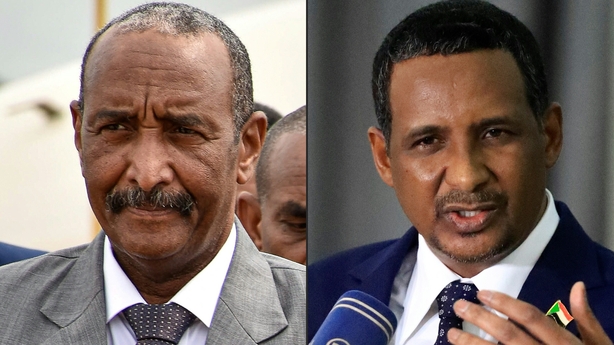As night falls in Khartoum, guns are expected to fall silent, as a week-long ceasefire takes effect.
The pause in fighting has been brokered by the United States and Saudi Arabia - two countries with a lot of influence in Sudan.
The ceasefire took effect at 9:45pm (8.45pm Irish time).
The hope is that it is a chance for crucial humanitarian assistance to be distributed to the millions of people affected by the conflict.
But this ceasefire is just the latest of several, all of them to date broken by the warring parties under the two rival generals, Abdel-Fattah Burhan of the Sudanese military and his once deputy, General Hemeti, leader of the paramilitary Rapid Support Forces.
The bitter power-struggle between these two men, who previously seized power together in a coup-d'etat, has wrought devastation on their country.
The UN estimates that hundreds of civilians have been killed, including 190 children and thousands more have been injured.
Around 25 million people are now in need of humanitarian aid while more than a million people have been displaced.
Hundreds of thousands of refugees have fled across borders and are living in temporary shelter in neighbouring countries.

Today, the United Nations Security Council held a special session on the crisis. The UN Secretary-General's representative in Sudan Volker Perthes detailed the affects of the fighting on the ground.
"In Khartoum, Darfur and elsewhere, the warring parties continue their fight without regard for the laws and norms of war," he told the Security Council.
"Homes, shops, places of worship and water and electricity installations have been destroyed or damaged. The health sector is collapsing with more than two-thirds of hospitals closed, many health care workers killed and medical supplies running low," he added.
Mr Perthes said he was appalled by the reports of sexual violence against women and girls, including allegations of rape in Khartoum and Darfur.

He said the United Nations was following up to verify these cases.
Critics have accused the United Nations and the wider international community of failing to spot the warning signs ahead of this outbreak of violence five weeks ago.
Pushing the generals towards a political solution when they had no intention of relinquishing their own power to a civilian government or each other, made violence inevitable, critics have said.
"The international actors participated in the creation of this situation," said Dr Amgad Fareid Eltayeb, a former chief of staff to the previous civilian-led government, led by Prime Minister Abdalla Hamdok.
He said: "By their continuous pushing for the formation of a government without thinking about the capacity of this government to address the issues of the transition."
The internationally designed political solution became about distributing power between the participants, he said, allowing the military components to fight over the real issue of their interest.
"And the military settles their differences only with guns," Dr Eltayeb added.

Today at the UN Security Council session, Volker Perthes responded to criticism.
"Some have placed the blame for this conflict on the international community for not having seen the warning signs," he told council members.
Mr Perthes said: "Others blame the political process, or the Framework Agreement, which intended to lead to a civilian-led government. Or the international community for giving an outsized role in the process to men with guns."
"But let us be clear: the responsibility for the fighting rests with those who are waging it daily: the leadership of the two sides who share accountability for choosing to settle their unresolved conflict on the battlefield rather than at the table. It is their decision that is ravaging Sudan. And they can end it," Mr Perthes added.
Representatives from the African Union and IGAD, the eight-country trading block of eastern Africa, also addressed the council, calling for a coordinated response from the international community to prevent the conflict spilling over and destabilising the wider region.
"A united coherent international coalition will be imperative to promote peace in Sudan," Bankole Adeoye, African Union Commissioner for Political Affairs, Peace and Security warned Council members.
"We must arrest Sudan's slide into complete collapse or chaos. This will have unbearable consequences for the region, for the African continent and the world at large," he added.







